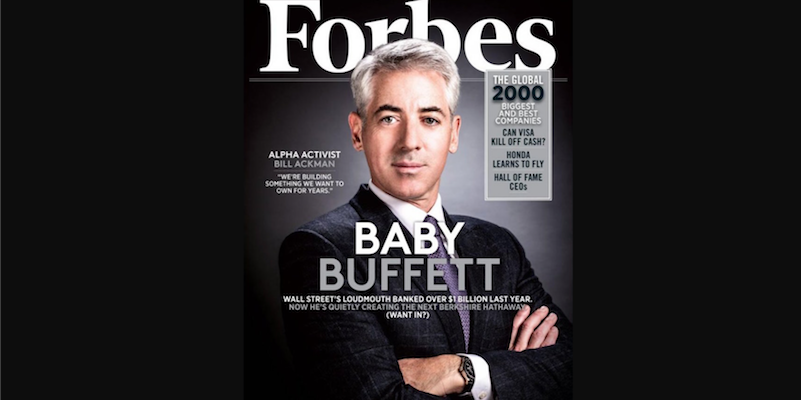
Nearly four years ago I used billionaire hedge fund manager Bill Ackman as a prime example of a delusional business leader who had gotten too close to his high-stakes bets and lost all objectivity. Today, CNBC reports that institutional investors have all but fled Ackman’s Pershing Square Capital, including longtime partner Blackstone Group.
It’s easy to see why. The hedge fund was down 20% in 2015, 13% in 2016 and 4% in 2017 on spectacularly bad bets on JC Penney, Herbalife, Valeant and Chipotle. The S&P 500 was up an average of 11% annually during the same period. Pershing investors lost billions on Ackman’s myopic hubris.
The point is not how prescient I am, but how visible this sort of thing can be. If I could see what Ackman couldn’t, the institutional investors and others who at one time trusted him with $20 billion of their money should have seen it too, and saved themselves and their investors a fortune.
It’s a priceless lesson for countless executives and business leaders – all of whom share the same Achilles heel as Ackman – and a cautionary tale for investors, employees and customers, as I explain in the following excerpt of my original FOX Business column:
This might be hard to believe, but every executive and business leader has the same blind spot: getting too close to a situation and losing perspective. That’s when we make big mistakes. Don’t take it personally; it’s a surprisingly common failure mode among otherwise smart and competent professionals.
Is it some sort of temporary psychosis that makes us lose touch with reality? Does our self-awareness suddenly abandon us and head off to the Bahamas for a vacation?
The culprit is hubris. Overconfidence. Success makes us think we’re infallible. And we somehow forget the age-old adage that past performance is no indication of future results.
The great irony is that, the closer we get to a situation, the more vehement our denials. If you want to see a CEO really dig in his heels, just suggest that he might be losing his objectivity and should step back a bit. After that, he’ll never let go.
One thing usually snaps us out of it in a heartbeat: an enormous disaster caused by our own foolishness. A big financial loss or public humiliation typically does the trick, at least after our shareholders read us the riot act and we’ve had some time to absorb what colossal dopes we’ve been.
Unfortunately, we’re not always held to account. Lately when CEOs take ludicrous risks with other people’s money and fail, instead of showing them the exit sign, we give them enormous exit packages. Then they get hired somewhere else and do the same thing all over again.
Then there are business leaders that go off the rails and end up in delusion town. Case in point, Bill Ackman.
I recently watched Ackman demonstrate – not for the first but the second time in recent memory – that he has lost all objectivity. And I’m wondering why last year’s brush with disaster at JC Penney didn’t wake him up to the perils of getting too emotionally attached to his own high-stakes bets.
To refresh your memory, Ackman’s handpicked CEO to turn around JC Penney, former Apple retail chief Ron Johnson, instead so decimated the company that it’s not at all clear if the 100-year-old brand will survive. That sparked a public boardroom brawl that led to Ackman stepping down, selling his entire stake, and taking a huge loss.
That should have been a wakeup call. Ackman should have realized right then and there that, as brilliant and savvy as he is, he had gotten too close to the situation and, as a direct result, made some terrible decisions.
Instead, Ackman doubled down on his $1 billion short position against Herbalife, announcing that he would “expose incredible fraud” at Herbalife in “the most important presentation that I have made in my career,” wherein he called it “a criminal enterprise,” a “pyramid scheme” and one of the “great frauds of all time.”
Maybe he was right. I certainly have no love for multi-level marketing or nutritional supplement companies. Herbalife is both. But after spending $50 million on an investigation, not to mention that over-the-top setup, all Ackman succeeded in doing was sending shares of Herbalife soaring 25% in one day.
Ackman had clearly crossed some sort of line, and not in a good way.
Perhaps we should have seen the writing on the wall when, on the heels of a very public defeat at JC Penney, Ackman vowed to take his fight against Herbalife “to the ends of the earth,” even with heavyweight Carl Icahn betting against him. If that doesn’t sound like the guy was too close to the situation, I don’t know what does.
Not to pick on Ackman or activist investors. I’ve seen more than a few CEOs make the same mistake. I guess we’ve all been there. But when it comes to high-stakes business, when you’re playing with other people’s money, you owe it to your stakeholders to be more self-aware, to have greater perspective and to leave your hubris at the door.
A version of this originally appeared at FOXBusiness.com.